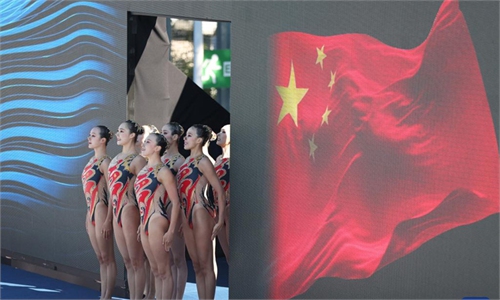SPORT / MISCELLANY
Swimming to set up ‘open category’ for transgender athletes
Swimming will set up an "open category" to allow transgender athletes to compete as part of a new policy which will effectively ban them from women's races.
"I do not want any athlete to be told they cannot compete at the highest level," Husain al-Musallam, president of governing body FINA, told an extraordinary congress of his organization.
"I understand why transgender athletes want to compete in the gender of their choice...but we should not favor one athlete over another."
"I will set up a working group that will establish an open category at some of out biggest events. We will be the first international federation to start this work."
He was speaking as FINA unveiled a policy on inclusivity which was then approved by the members.
The policy received a cautious welcome from American swimmer Alex Walsh after she won the women's 200 meters medley at the world championships.
"I'm happy that FINA are... re-evaluating the rules," she said.
"I am not really sure what the answer is to keep things fair but obviously I hope that everyone is able to compete and as long as they are finding a way to do that then I am happy."
Brent Nowicki, FINA's CEO, said the organization was determined "to maintain the separation of aquatic sports into men's and women's categories."
He added that "FINA recognizes that ... this policy means certain individuals may not be able to compete in the category that best aligns with their legal gender, gender identity or gender expression."
Under the rules, he said, male competition would effectively be open to all.
But "male-to-female transgender athletes ... can only compete as female athletes in FINA competition, and set a world records in the female category, if they can establish they have not experienced any part of male puberty."
In the debate that followed, the policy drew criticism from members of the FINA medical committee Christer Magnusson, of Sweden, and David Gerrard from New Zealand.
"To ask or expect an 11, 12 year old boy to make a decision that will effect the rest of his life is a big ask," said Gerrard.
Last year, the International Olympic Committee announced guidelines but asked federations to produce their own "sport-specific" rule.
FINA set up three expert committees, one medical, one legal and one of athletes, to look at the issue.
The medical committee found that men who transitioned to woman retained advantages.
"Some of the advantages males acquire in puberty are structural and are not lost with hormone suppression," said Dr Sandra Hunter of the Marquette University in Milwaukee.
"I do not want any athlete to be told they cannot compete at the highest level," Husain al-Musallam, president of governing body FINA, told an extraordinary congress of his organization.
"I understand why transgender athletes want to compete in the gender of their choice...but we should not favor one athlete over another."
"I will set up a working group that will establish an open category at some of out biggest events. We will be the first international federation to start this work."
He was speaking as FINA unveiled a policy on inclusivity which was then approved by the members.
The policy received a cautious welcome from American swimmer Alex Walsh after she won the women's 200 meters medley at the world championships.
"I'm happy that FINA are... re-evaluating the rules," she said.
"I am not really sure what the answer is to keep things fair but obviously I hope that everyone is able to compete and as long as they are finding a way to do that then I am happy."
Brent Nowicki, FINA's CEO, said the organization was determined "to maintain the separation of aquatic sports into men's and women's categories."
He added that "FINA recognizes that ... this policy means certain individuals may not be able to compete in the category that best aligns with their legal gender, gender identity or gender expression."
Under the rules, he said, male competition would effectively be open to all.
But "male-to-female transgender athletes ... can only compete as female athletes in FINA competition, and set a world records in the female category, if they can establish they have not experienced any part of male puberty."
In the debate that followed, the policy drew criticism from members of the FINA medical committee Christer Magnusson, of Sweden, and David Gerrard from New Zealand.
"To ask or expect an 11, 12 year old boy to make a decision that will effect the rest of his life is a big ask," said Gerrard.
Last year, the International Olympic Committee announced guidelines but asked federations to produce their own "sport-specific" rule.
FINA set up three expert committees, one medical, one legal and one of athletes, to look at the issue.
The medical committee found that men who transitioned to woman retained advantages.
"Some of the advantages males acquire in puberty are structural and are not lost with hormone suppression," said Dr Sandra Hunter of the Marquette University in Milwaukee.




